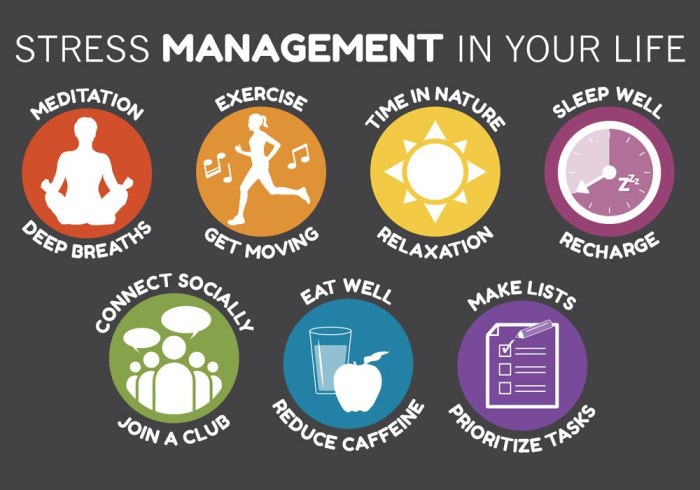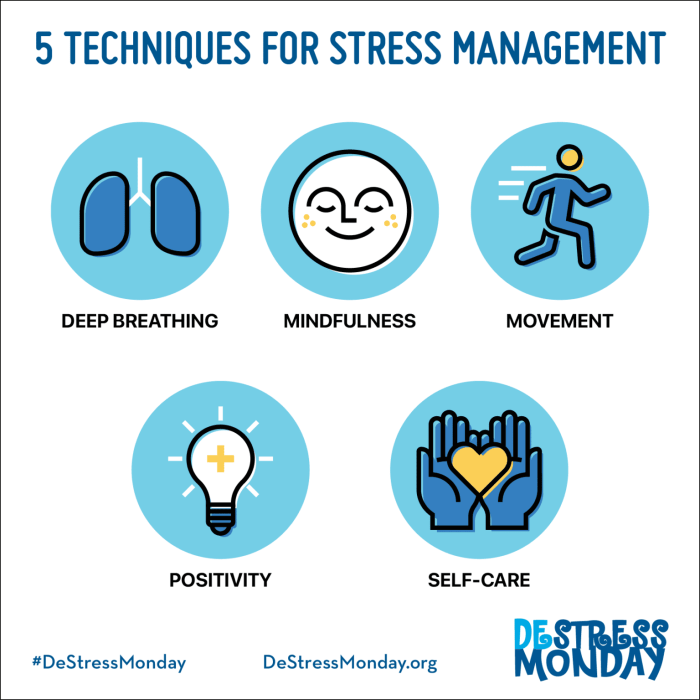Stress Management Tips kick off the journey to a healthier lifestyle, diving into practical techniques and habits to conquer stress like a boss.
Learn how to slay stress with mindfulness, exercise, and healthy choices that will have you feeling like a rockstar in no time.
Importance of Stress Management Tips
Stress management tips play a crucial role in maintaining overall well-being. Effective stress management can significantly improve mental health by reducing anxiety, depression, and other psychological issues. It allows individuals to cope with daily challenges, enhance resilience, and foster a positive mindset. Moreover, managing stress is essential for physical health as prolonged stress can lead to various health problems such as high blood pressure, heart disease, and weakened immune system.
Impact of Stress on Physical Health
Stress has a direct impact on physical health, triggering the release of stress hormones that can disrupt the body’s natural balance. Chronic stress can contribute to inflammation, digestive issues, headaches, and muscle tension. By implementing stress management techniques, individuals can lower their risk of developing these health conditions and improve their overall quality of life.
Strategies for Stress Management

Feeling overwhelmed by stress? Here are some practical techniques to help you manage and reduce stress levels in your life.
Mindfulness and Meditation, Stress Management Tips
Practicing mindfulness and meditation can greatly reduce stress and anxiety. Taking a few minutes each day to focus on the present moment and clear your mind can have a significant impact on your overall well-being. By being more aware of your thoughts and emotions, you can learn to manage them better and prevent stress from building up.
- Start with deep breathing exercises to help center yourself.
- Practice gratitude by focusing on the positive aspects of your life.
- Use guided meditation apps or videos to help you relax and unwind.
- Set aside time each day for mindfulness activities, such as yoga or journaling.
Exercise
Exercise is not only beneficial for your physical health but also plays a crucial role in reducing stress and improving mental well-being. When you engage in physical activity, your body releases endorphins, which are natural mood lifters. Regular exercise can help you feel more energized, focused, and positive, making it easier to cope with the challenges of daily life.
- Find an exercise routine that you enjoy, whether it’s running, dancing, or weightlifting.
- Take a walk outside to get some fresh air and clear your mind.
- Join a group fitness class to stay motivated and meet new people.
- Practice yoga or tai chi for a combination of physical activity and mindfulness.
Healthy Lifestyle Habits

Living a healthy lifestyle is crucial for managing stress effectively. Incorporating good habits into your daily routine can have a significant impact on your overall well-being.
Healthy Eating Habits
- Eating a balanced diet rich in fruits, vegetables, whole grains, and lean proteins can provide your body with the necessary nutrients to combat stress.
- Avoiding excessive consumption of caffeine, sugar, and processed foods can help stabilize your mood and energy levels, reducing stress and anxiety.
- Staying hydrated by drinking plenty of water throughout the day is essential for maintaining optimal brain function and managing stress.
Getting Enough Sleep
- Getting 7-9 hours of quality sleep each night is vital for stress management as it allows your body and mind to rest and recharge.
- Establishing a bedtime routine, avoiding screens before bed, and creating a comfortable sleep environment can promote better sleep and reduce stress levels.
- Chronic sleep deprivation can lead to increased irritability, poor concentration, and heightened stress responses, underscoring the importance of prioritizing sleep.
Social Connections and Hobbies
- Cultivating strong social connections with friends and family can provide emotional support, reduce feelings of loneliness, and boost overall happiness, all of which contribute to lower stress levels.
- Engaging in hobbies and activities that you enjoy can serve as a form of relaxation and distraction from daily stressors, promoting a sense of fulfillment and well-being.
- Participating in group activities, joining clubs, or volunteering can also help build a sense of community and belonging, which is essential for managing stress effectively.
Workplace Stress Management
In today’s fast-paced work environment, it’s crucial to address workplace stress effectively to maintain a healthy work-life balance and overall well-being. By identifying common stressors in the workplace and implementing strategies to manage them, individuals can significantly reduce stress levels and improve their quality of life.
Common Stressors in the Workplace
- Heavy workload and tight deadlines
- Interpersonal conflicts with colleagues or superiors
- Lack of control over tasks and projects
- Unclear job expectations and responsibilities
- Poor communication and feedback
Addressing Workplace Stressors
- Practice effective time management and prioritize tasks
- Communicate openly and assertively with colleagues
- Seek support from supervisors or HR for conflict resolution
- Set clear boundaries and learn to say no when necessary
- Take short breaks throughout the day to recharge and refocus
Setting Boundaries for Work-Life Balance
- Establish a designated workspace and set specific work hours
- Avoid checking work emails or messages outside of work hours
- Delegate tasks when feeling overwhelmed
- Engage in stress-reducing activities outside of work, such as exercise or hobbies
- Prioritize self-care and make time for relaxation and rejuvenation
